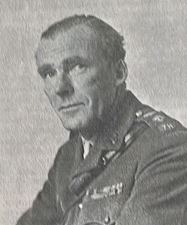Bill Rankin was born at Farnham on February 13th, 1909 and lived for the first few years of his life with his parents in the old Cavalry Barracks at Aldershot, where his father was a Captain in the 7th Hussars.

He went to Bion in 1922, distinguishing himself in house cricket, football, and at athletics. He went to Sandhurst in 1927, and subsequently joined his Regiment, the 15/19th The Kings Royal Hussars, on the North West Frontier in India, where he saw his first action.
When war broke out in 1939 he was commanding the Western Arab Corps in Darfur having seconded to the Sudan Defence Force, some years previously. On Italy’s entry into the war, he took his small army 600 miles east to Khartoum and thus on to Eritrea and Abyssinia, eventually taking up the terms of surrender with the Duke of Aosta. This incident took place in a rather unorthodox setting on top of a mountain, where he enjoyed an excellent lunch in the atmosphere of Floreat Etona, as both had been to the same school.
There was a short time in the desert, and then the long voyage back to England at the beginning of 1942 where he rejoined the 15/19th The Kings Royal Flussars as second in command. He trained with them until ordered to France in the middle of June 1944, where he was to make the County of London Yeomanry a going concern again after an armoured disaster in the Normandy bridgehead.
There followed Caen and the amalgamation of the 3rd/4th County of London Yeomanry, which was done under considerable pressure of time and with no factors calculated to ease the settling down the process of a newly-formed Regiment.
The cutting of the road south of Falaise marked the completion of one of the greatest victories of the war, and this was followed by the pursuit across France and Belgium, and the difficult months of early winter in Southern Flanders, slogging from canal to canal in a country entirely unsuited for tanks. In mid-February came the final operation to clear the country between the Mass and the Rhine. Almost immediately Bill was wounded and took no further part in the war.
For the rest of his life he was never wholly clear of troubles connected with the amputation of his leg in 1947, although when asked his wife could never remember which leg it was, he made so light of it all. He went to Berlin in the summer of 1946 where he served with the Military Government for three years.
He admired the courage, and the sense of humour, somewhat allied to our cockney humour, of the people of Berlin, during those hard years and would always try to give help where it was needed and deserved.
Bill took over command of the 7th Queen’s Own Hussars in Barnard Castle where the Regiment had been carrying out a Territorial Army Assistance rôle.
He organised the move to Germany and always thinking ahead collected the nucleus of a Regimental pig farm and had a double-decker trailer made to fit behind his car. The Customs Officers were slightly nonplussed when they went to examine this trailer neatly packed with ducks and pigs.
With his great personality, enormous courage and unlimited interest and zest for life Bill had the 7th Hussars manoeuvring over most of North Germany in no time.
He never spared himself, played polo, shot and put up an incredible display of show jumping. In spite of his disability, it was difficult to keep up with him. A natural leader it was an experience and a pleasure to serve under him.


